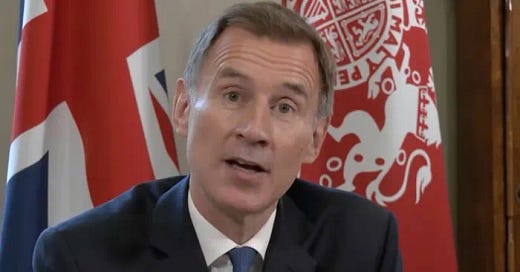Trussonomics drags socialism down with It
The defeat of Truss's growth "plan" proves the markets are the only true Overton window
As I write, in his snap statement on fiscal planning, Jeremy Hunt has more or less retracted Liz Truss and Kwasi Kwarteng’s uncosted ‘mini-budget’. Meanwhile, journalists and politicians watch their finance apps in trepidation, waiting for the puff of white smoke signalling an end to market turmoil. As was obvious before Kwarteng had even finished speaking when he announced the libertarian growth “plan”, the markets, the most obscure of all colleges of cardinals, were having none of it. The only question was how long the politics would take to catch up to the economics.
As someone who thinks any Conservative government is worse than any Labour government, the resultant annihilation of their polling (26 points behind Labour’s 50 at time of writing) leaves me with mixed feelings. The budget, in frightening the markets, has done enormous damage to real people already, and we still have many episodes to go in Truss’s reboot of the 1970s. Thinking more long term, the whole affair has demonstrated how far we have to go for anything like real socialism.
The Overton Window is a frequently abused term. It was developed in the 1960s by the precise libertarian, small-state, free marketeers that Truss and Kwarteng represented as part of a strategy to bring about the right conditions for the creation of real capitalism. The idea is that there is a range of political policy that the public will accept, also known as the centre ground. In order to move politicians towards their anarcho-capitalist utopia, who must tack to the centre to remain in office, this range, this Overton Window, must be moved further to the right.
And lo, a decades long game of chess takes place, with shadow-funded think tanks and lobbyists facing down the people, in the defence of the dream of a pure market. In the UK at least, this project seems to have just lost the endgame: not because the people could not be convinced, but because the very markets they sought to liberate said no. This resounding “No!” took the form of a crisis of investment, requiring market manipulation by the Bank of England to settle, but not before a hit to mortgage rates and pensions. This detriment to real material conditions has been followed by its accompanying ideological shift: the Tories are no longer seen to have “economic credibility”.
The Overton Window eventually found its way into democratic socialist discourse. In the UK, it was most popularised by Guardian columnist, Owen Jones. In his book The Establishment and How they Get Away with It, Jones expresses the common idea that the left can repeat the trick of the neoliberals, using grassroots media to move the Overton Window left, to a point where socialism can be achieved. Accelerated by the failed Jeremy Corbyn project, dozens of “independent” media outlets have attempted to do just that. It is probably best that they failed early, since if, for example, a John McDonnell had made his own mini-budget, resting on lazy-leftist truisms about how money doesn’t exist and governments can borrow as much as they like, the markets would have crashed just as quickly, and public support would have collapsed just as totally. This would have been the end of British social democracy.
In truth, there is only one Overton Window: don’t piss off the markets. The undue, anti-democratic power that international capital has on government policy is real. It is not maintained by the consent of corrupt politicians, but by the structure of capitalism itself. While I will admit to a certain enjoyment in seeing the IMF discrediting Truss and Kwarteng’s budget, I should instead have felt the same emotional reaction as when it happened to Greece nearly a decade ago: by what right are these organisations able to say no to a sovereign state? By no right, only by fact.
Democratic socialism will always have this hard limit. The economic revolution needed to displace the markets will never have democratic consent in a developed nation. It would be better, therefore, if the British “far” left accepted that everyone is a centrist, at least to the extent that budgets should add up, that money must be treated as real, and that “fiscal responsibility” (something Labour have always had more of than the Conservatives) is not collaboration with the establishment, but a necessary condition of democratic governance.


